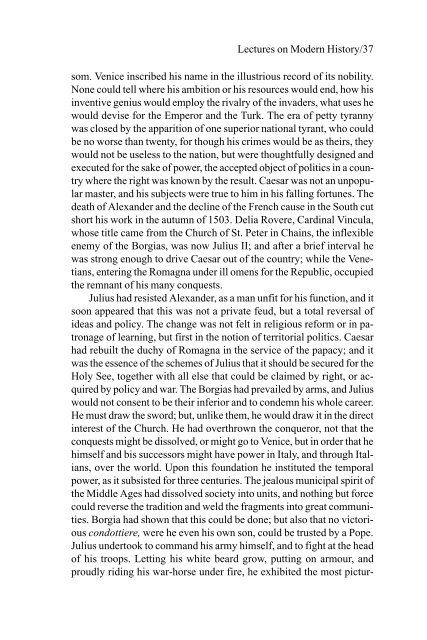Lectures on Modern History - Faculty of Social Sciences
Lectures on Modern History - Faculty of Social Sciences
Lectures on Modern History - Faculty of Social Sciences
Create successful ePaper yourself
Turn your PDF publications into a flip-book with our unique Google optimized e-Paper software.
<str<strong>on</strong>g>Lectures</str<strong>on</strong>g> <strong>on</strong> <strong>Modern</strong> <strong>History</strong>/37som. Venice inscribed his name in the illustrious record <strong>of</strong> its nobility.N<strong>on</strong>e could tell where his ambiti<strong>on</strong> or his resources would end, how hisinventive genius would employ the rivalry <strong>of</strong> the invaders, what uses hewould devise for the Emperor and the Turk. The era <strong>of</strong> petty tyrannywas closed by the appariti<strong>on</strong> <strong>of</strong> <strong>on</strong>e superior nati<strong>on</strong>al tyrant, who couldbe no worse than twenty, for though his crimes would be as theirs, theywould not be useless to the nati<strong>on</strong>, but were thoughtfully designed andexecuted for the sake <strong>of</strong> power, the accepted object <strong>of</strong> politics in a countrywhere the right was known by the result. Caesar was not an unpopularmaster, and his subjects were true to him in his falling fortunes. Thedeath <strong>of</strong> Alexander and the decline <strong>of</strong> the French cause in the South cutshort his work in the autumn <strong>of</strong> 1503. Delia Rovere, Cardinal Vincula,whose title came from the Church <strong>of</strong> St. Peter in Chains, the inflexibleenemy <strong>of</strong> the Borgias, was now Julius II; and after a brief interval hewas str<strong>on</strong>g enough to drive Caesar out <strong>of</strong> the country; while the Venetians,entering the Romagna under ill omens for the Republic, occupiedthe remnant <strong>of</strong> his many c<strong>on</strong>quests.Julius had resisted Alexander, as a man unfit for his functi<strong>on</strong>, and itso<strong>on</strong> appeared that this was not a private feud, but a total reversal <strong>of</strong>ideas and policy. The change was not felt in religious reform or in patr<strong>on</strong>age<strong>of</strong> learning, but first in the noti<strong>on</strong> <strong>of</strong> territorial politics. Caesarhad rebuilt the duchy <strong>of</strong> Romagna in the service <strong>of</strong> the papacy; and itwas the essence <strong>of</strong> the schemes <strong>of</strong> Julius that it should be secured for theHoly See, together with all else that could be claimed by right, or acquiredby policy and war. The Borgias had prevailed by arms, and Juliuswould not c<strong>on</strong>sent to be their inferior and to c<strong>on</strong>demn his whole career.He must draw the sword; but, unlike them, he would draw it in the directinterest <strong>of</strong> the Church. He had overthrown the c<strong>on</strong>queror, not that thec<strong>on</strong>quests might be dissolved, or might go to Venice, but in order that hehimself and bis successors might have power in Italy, and through Italians,over the world. Up<strong>on</strong> this foundati<strong>on</strong> he instituted the temporalpower, as it subsisted for three centuries. The jealous municipal spirit <strong>of</strong>the Middle Ages had dissolved society into units, and nothing but forcecould reverse the traditi<strong>on</strong> and weld the fragments into great communities.Borgia had shown that this could be d<strong>on</strong>e; but also that no victoriousc<strong>on</strong>dottiere, were he even his own s<strong>on</strong>, could be trusted by a Pope.Julius undertook to command his army himself, and to fight at the head<strong>of</strong> his troops. Letting his white beard grow, putting <strong>on</strong> armour, andproudly riding his war-horse under fire, he exhibited the most pictur-
















